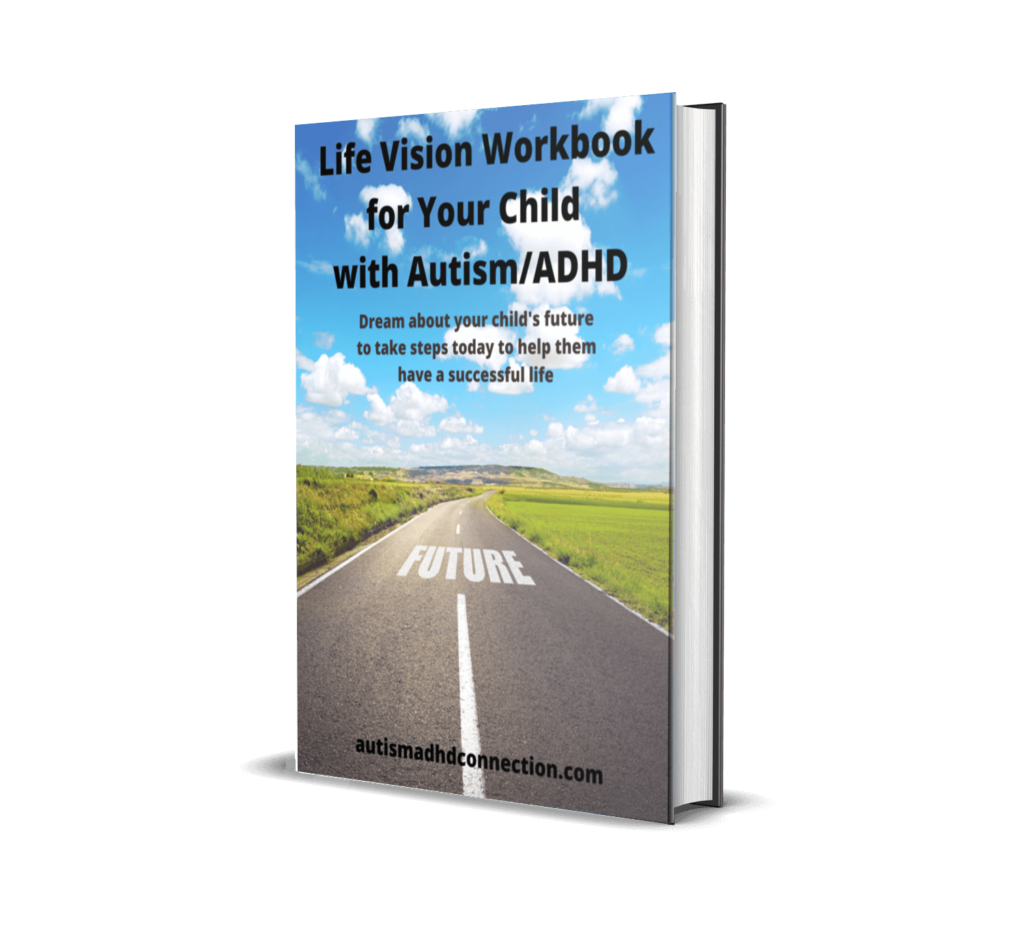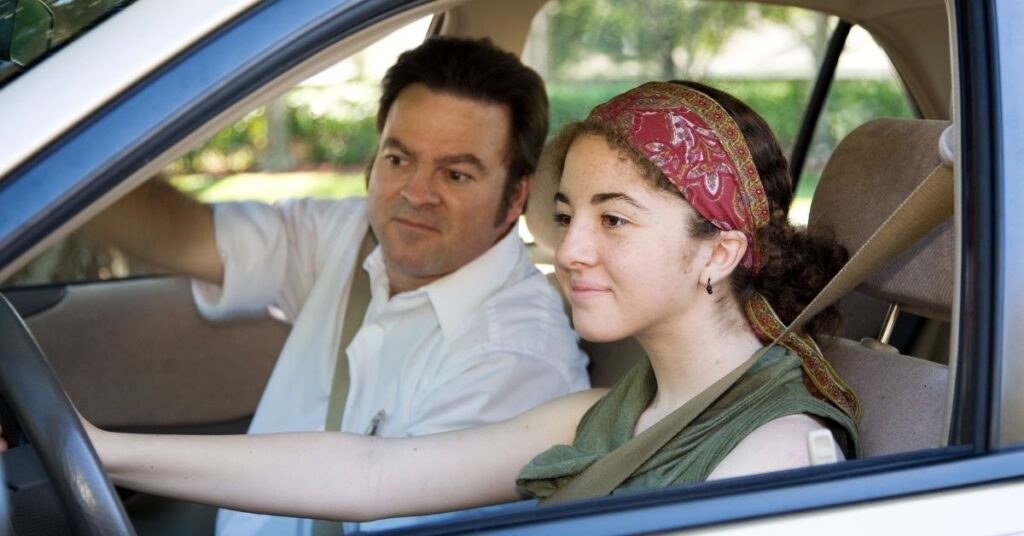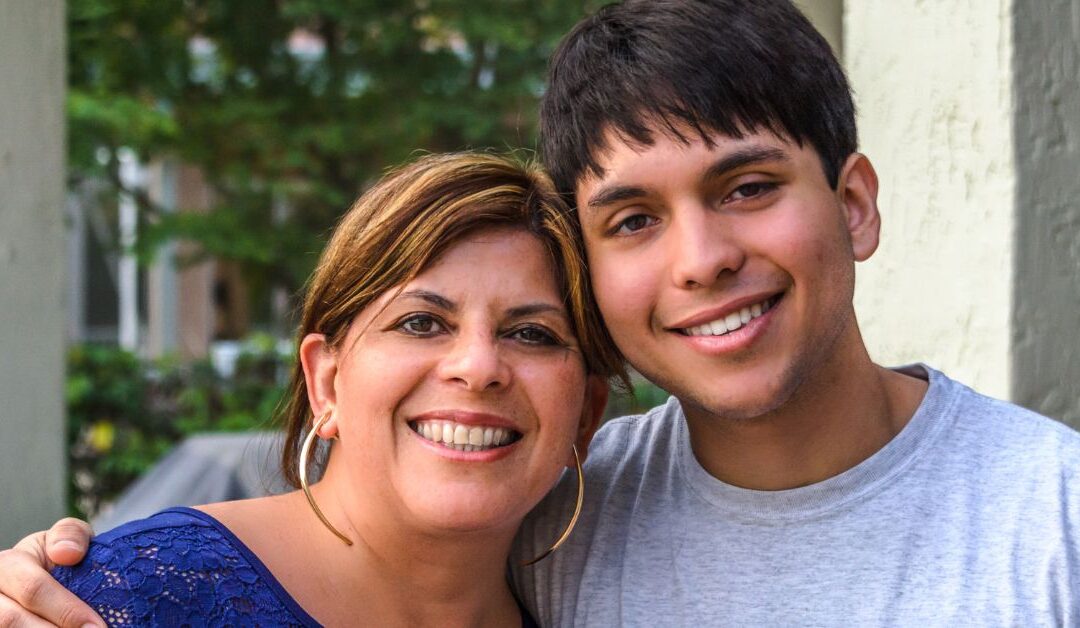Our children won’t stay young forever. All parents know that; however, it means something different to those of us who have autistic children. Thinking about our autistic children becoming adults instills so much fear into many of us. Yet, we know our children growing up is inevitable. So how can you face and conquer your fear of your autistic child becoming an adult?
The statistics for autistic adults are worrisome
I admit that whenever I look at the statistics for autistic adults, I worry whether my son J will fit them. Autism is a broad spectrum of capabilities. For some autistic adults, they go to college or other post-secondary education, hold good jobs, buy their homes, marry, have children and live what society would call a more “normal” life. (Yes, I know – normal is a setting on a dryer 😊 But you know what I mean.) For others, they have a more severe form of autism and will never be able to live independently. Then there are so many who fall somewhere in between.
So what are the statistics for what life is like for autistic adults and the transition from teens to adults? Autism Speaks has done a lot of research in this area. Here are some numbers they’ve published:
- “Over the next decade, an estimated 707,000 to 1,116,000 teens (70,700 to 111,600 each year) will enter adulthood and age out of school based autism services.
- Teens with autism receive healthcare transition services half as often as those with other special healthcare needs. Young people whose autism is coupled with associated medical problems are even less likely to receive transition support.
- Many young adults with autism do not receive any healthcare for years after they stop seeing a pediatrician.
- More than half of young adults with autism remain unemployed and unenrolled in higher education in the two years after high school. This is a lower rate than that of young adults in other disability categories, including learning disabilities, intellectual disability or speech-language impairment.
- Of the nearly 18,000 people with autism who used state-funded vocational rehabilitation programs in 2014, only 60 percent left the program with a job. Of these, 80 percent worked part-time at a median weekly rate of $160, putting them well below the poverty level.
- Nearly half of 25-year-olds with autism have never held a paying job.
- Research demonstrates that job activities that encourage independence reduce autism symptoms and increase daily living skills.”
Transition from teen to adult

Right now, we are going through helping our son J transition to adulthood. He is a senior in high school, and it is a balancing act of pushing him and letting him take on more responsibility. It’s difficult because he has a lot of his own fear of becoming an adult. There is so much adulting that needs to be learned, and it can seem overwhelming for our autistic teens and us as parents. As parents, this plays into our fear of our autistic child becoming an adult.
From a school perspective, transition planning should take place during the middle school (or junior high) through high school years. It’s an important piece of the overall picture because they can help your teen think through potential careers and education paths after high school, whether that is a trade school, apprenticeship, community college, four-year university or other education.
As parents, we need to think through life skills that we need to teach our autistic teen. There are so many they must learn – money management, self-care, self-advocacy, organization skills, household maintenance, and so much more. For the most important life skills to concentrate on teaching your teen, see this blog post.
We have so many questions about what life will be like for our autistic child when they become adult, and we fear there are so few answers. We ask:
- Will my teen be able to successfully complete post-secondary education?
- Will my young autistic adult be able to find and keep a job?
- Where will my child live when they are an adult? Will I need to continue supporting them and for how long?
- How will my child manage their affairs when they are an adult?
- What will happen when I am no longer able to help my child when they are an adult?
Take action to conquer your fear of your autistic child becoming an adult
These and other questions swirl around in our minds. At least, I know they do mine. They have become louder and come more often as my son J has gotten older. Yet, I couldn’t bury my head in the sand and do nothing. I’ve had to face them to be able to overcome them. I feel better today than I did even a year ago. There are still a lot of unanswered questions, but there always will be. I can only control what I can control.
So what has helped me better manage my fear of my autistic child becoming an adult? I’m sharing what has helped me with the hope that it can help you too. Try one, a few or all of these. They also may spark some other ideas for you.
1. Be active in planning for your child’s future

As parents of autistic children, we are often overwhelmed in the moment with all of the things. Therapy appointments, schoolwork, behavior challenges, routines and more. We put off thinking about the transition our children will go through as they near adulthood. Yet, it’s not too early to start actively planning. Pay close attention to what steps your child’s school is taking with transition planning and ensure the right activities are added to their individualized education plan. You also can use my Life Vision Workbook to start thinking about and planning for your child’s future. It’s free, and you can update it each year as your child grows and learns more about their skills and interests.
2. Don’t underestimate your teen’s abilities
As daunting as the autistic adult statistics are, I don’t have to accept that those will be true for my son. Every year, he gains more maturity and skills. I have to focus on what he may be able to accomplish and plan toward that. Yes, it means I still need to be realistic about different scenarios that aren’t as good (see more below), but I am planning for a better life for him.
3. Encourage your teen to dream about their future and take steps toward making those a reality
What is your teen’s special interest? Is it something they could pursue as a future career? What can you do to encourage that pursuit? For our son J, his special interest is music. He also scores high on career tests for wanting to help others. As we talked about future careers tying those together, becoming a music therapist seems like it could be a good fit.
J was a music therapy participant himself, receiving those services for three years. He had to write a career exploration paper for his English class during his junior year of high school, so he learned a lot more about it. This year, music therapy is the focus of his senior capstone project. He had a music therapist as his mentor for the project, and he was able to job shadow for two days.
Since his grades aren’t quite good enough to go directly into the local four-year university that offers a music therapy program, he will start at a community college near us to complete the core classes needed and get his grades up. In addition, starting at this very small community college campus I think also sets him up better for a successful transition to college.
Think about what steps you can take to encourage your autistic teen to dream about their future and how you can enable next steps toward making it a reality.
4. Prepare for legal and financial needs
When your teen turns 18 years old, they are considered the legal age of an adult. That means they are technically in charge of their own health care, financial and other affairs. Yet, for most of our autistic teens, they still need a lot of help. That is why you need to take steps to at least put into place the paperwork needed to help them.
A few months before our son J turned 18, we met with a special needs lawyer who was recommended by some friends as well is listed on the Special Needs Alliance directory. He was so helpful to us to recommend the paperwork we needed in place for J, along with updates to our estate planning documents. Right after he turned 18, J signed his HIPAA release form to allow my husband and me to continue managing his health care. He also signed a power of attorney so that we can help with legal and financial matters if he cannot do so himself.
In addition, our lawyer was able to set up our family trust so that if J’s portion needs to be adapted to a special needs trust, it can easily be set up that way. If he doesn’t need a special needs trust, then his portion will act as a regular trust. We still have a lot of questions about whether J will be able to support himself independently. This option allows us to feel like he will be taken care of either way.
You also will need to think through whether supported decision-making is appropriate for your autistic teen when they become an adult or if legal guardianship and conservatorship may be needed for your young adult.
5. Concentrate on the most important life skills your teen still needs to learn to be independent

Adulting is a lot of work, and we need to be sure our teens are ready to take on those responsibilities. Yet, we don’t want to overload them all at once. Therefore, look at some of the most important things you need to teach your teen now and concentrate on those.
For my son J, here are the skills we are focused on at the moment:
- Learning to drive. He finished the online course for driving education, and we are studying and preparing him for the permit test. Once he has his learner’s permit, then I can enroll him a local behind-the-wheel driving course with an instructor. Because he is 18, he has to obtain his learner’s permit first.
- Managing his money. J has had a part -time job on weekends for almost a year now. He has checking and saving accounts. We also set him up with his own budget on our You Need a Budget account (referral link). Learning how to manage his own money takes time and practice. It also means making mistakes and learning from those.
- Improving his study habits. Unfortunately, his study habits still aren’t great, but we are making some progress. He has a great plan we created based on his ideas from research we did together. The more he can learn before he graduates from high school, the better for him as he enters community college.
- Increasing his cooking skills. Cooking is truly an essential life skill. He is great with microwaving food and preparing his own simple meals. Now we need to focus on helping him to make some basic meals using the stove, oven and crockpot.
- Doing his own laundry. We recently decided that both of our boys needed to be responsible for their own laundry. They now each have their own laundry basket in their closet, and they are accountable for washing, drying, folding and putting up their own laundry each week. They’ve had a lot of experience with putting laundry in the washer and dryer, but it’s the folding they both need more practice to master.
6. Determine what help your teen or you need during the transition
During this transition time, your autistic teen should still have access to quite a few resources through their school, Medicaid autism waiver and Vocational Rehabilitation. Take advantage of every opportunity for help with their transition.
Be sure your autistic teen starts working during high school. They may qualify for your local Vocational Rehabilitation program and obtain a job coach. Learn about our experiences in this blog post.
Seek out the help from an autism transition coach if you need and can afford it. I talked to a coach, and we decided it wasn’t the right step for J. However, she gave me some wonderful guidance for him as immediate actions. For this summer, I’ve applied for him to attend the College Internship Program in a city near us. This was a program she highly recommended. I’m hopeful that he will be accepted. While it is pricier than I anticipated, it will be worth the dollars if he can gain valuable independent skills and build some friendships during this two weeks next summer. I never would have known this program existed if I had not reached out for help.
In addition, J has joined the Young Adult Connection program offered by our local Autism Community Connection. This is a program that allows him to develop friendships with other autistic young adults in our community and learn valuable life skills. Another important factor for him is that he will continue in this program after high school. That is one thing I’m focused on this year too – activities he can begin now and continue after high school graduation.
7. Think through best to worst case scenarios
As I noted before, we cannot put our heads in the sand and ignore the realities of having an autistic young adult. All those questions we have? It’s best to think about the best to worst scenarios so that we can prepare for whichever outcome our child will have when they become an adult. I’ve spent a lot of time recently thinking about these. I’m shooting for the best outcome but know that we need to be prepared when/if things don’t go as planned. How do we pivot as things change for the better or worse? What can we do to continue to support our children as needed to help them live the best lives of which they are capable?
8. Understand the launch into adulthood will take longer for your autistic child

We have to understand that our autistic young adults will most likely not have a typical launch into adulthood – either in steps or timing. Be realistic and flexible when it comes to the path and how long it will take for your autistic young adult to fully be on their own. Or if they won’t be able to live independently, how much can they do for themselves? Help them to be as independent as they are able and make as many of their own decisions as they can.
9. Accept that your child will be their own adult and will want to make their own decisions
I think this one is tough for all parents but especially for those of us with autistic children. We’ve dedicated our lives to supporting and helping them at high levels. Sometimes, it is hard to remember that they will be their own persons with their own hopes, dreams and decisions. Remember that it is their life they need to lead – not the one you choose for them.
10. Remember to take care of yourself
You are no good to anyone else if you do not take care of yourself. You know the safety guidance on planes – put your own oxygen mask on first before helping others. If you aren’t in good mental and physical health, you cannot effectively help your child.
11. Talk to parents of autistic young adults
Do you know parents of autistic young adults? If so, then talk to them. I am lucky to know several parents who are further along this journey, so I have been able to ask them about their experiences. Their stories and learning have been so valuable to me. I also don’t feel alone in this endeavor. Ask them how they conquered their own fear of their autistic child becoming an adult.
12. Learn to let go when the time comes
Every parent needs to learn when to let go when the time comes. It is true for those of us with our autistic children too. I know for those with children who have more severe autism, this will look different. And I acknowledge we always will champion and worry about our children no matter what age they are. That is the way of parenting, especially when we have been so involved in every aspect of our children’s lives.
In addition to facing our own fears, I know that our autistic teens are dealing with a lot of fear themselves about becoming adults. That’s going to have to be another blog post 😉 Right now, you can take steps to overcome your own fear of your autistic child becoming an adult.
Additional Resources
Do you need to dive deeper into this topic to assist your autistic teen through the transition to adulthood? If so, here are some suggested resources for you.
The ASD Independence Workbook: Transition Skills for Teens and Young Adults with Autism (affiliate link)
The Autism Transition Guide: Planning the Journey from School to Adult Life (affiliate link)
The Autism Full Employment Act: The Next Stage of Jobs for Adults with Autism, ADHD, and Other Learning and Mental Health Differences (affiliate link)
Preparing for Life: The Complete Guide for Transitioning to Adulthood for Those with Autism and Asperger’s Syndrome (affiliate link)
What have you done to address your fear of your autistic child becoming an adult? Leave a comment to share and encourage others on this journey!







